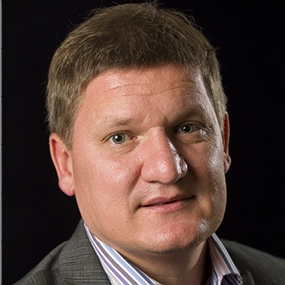Learning lessons from COVID-19 in Cardiff

Dr Abrie Theron is a Clinical Director at the Cardiff and Vale University Health Board. He’s a member of RCoA Council and is passionate about perioperative care. Here, he reflects on how Cardiff managed the COVID-19 pandemic.
During the pandemic we did things differently…
We were all scared and felt helpless, but we stood together and went back to basic principles. Every member of the anaesthetics department in Cardiff brought what they could offer to try and prepare us as well as possible for the unknown.
Our initial focus was on how to manage COVID-19 patients needing our help. Overnight the airway and simulation teams put training packages together and we trained every person willing to be trained in personal protective management and fitted them with a suitable mask by our team of mask fitters.
We have put multidisciplinary teams together to work 12 hour shifts, seven days a week to cover both emergency surgery as well as the airway management of patients needing to be treated in intensive care with ventilators. We were slow in the beginning, but we got better and faster.
As the beds in intensive care were filling up, we were worried that we were going to run out of intensive care beds and ventilators; and even more fundamentally, oxygen! The Health Board negotiated an oxygen plant that was meant for a new hospital and we started to convert operating theatres into three-bed intensive care pods.
Our focus then moved towards reinstating urgent elective surgery by creating safe clinical areas for our patients. A small but determined team of key personnel from all relevant disciplines were given a member of staff from the Corporate Improvement & Implementation Service to support the project.
The pandemic focused our minds and created a sense of urgency. Emerging local and international data suggested patients faced a very high post-operative mortality following major surgery if they developed COVID-19 during their inpatient stay.
There was an element of reconfiguration of wards needed and enabling work to create a ‘hospital within a hospital’ with separate entrances and exits for both patients and staff. Each unit had strict rules in relation to access and timetabling of workforce, with a clear admissions policy and patient safety at its heart.
All patients were pre-assessed in Pre-operative Assessment Clinics and prepared to minimise the risk of cancellation. They were then asked to isolate and were tested before admission.
In late May, we introduced phase one and created a discrete Protected Elective Surgery Unit (PESU) in a small portion of the hospital. By June, phase two was up and running with an additional ward and theatre created, delivering safe care for patients needing the most urgent surgery. Cardiac and thoracic surgery were now delivered in a PESU in a different hospital.
The final phase saw a new post anaesthetic care unit (PACU) for enhanced care open in PESU in November, ready for winter. We are now approaching 10 000 operations in our PESUs. To date, we have not had one case of COVID-19 infection while patients were in hospital.
Our philosophy was to work smarter not harder, to systematically tackle the challenges we faced and leave all individual baggage at the door. The teams were empowered to deliver specific objectives benefiting the overarching principles. Themes were developed and timelines produced to facilitate a rapid response and change.
Every team member was invested in solving the problems we faced and brought innovative solutions, we did not teach or tell, we listened, engaged and removed barriers. We created a structure and system to support our leadership methodology and continually communicated our vision and our plans to all parties.
I hope we can continue doing things differently in Cardiff!
The RCoA has published its report ’10 lessons learnt from COVID-19 – focus on anaesthesia and intensive care’. You can read the full report here.
